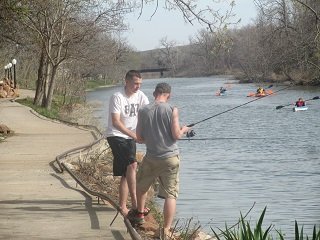 There’s something to be said about the tranquility of hitting your favorite honey hole early in the morning with nothing around to distract you. As pleasing and relaxing as fishing on your own can be, it’s also very enjoyable when it’s done with friends and loved ones. One thing I love about fishing is introducing people to the sport and teaching them the tricks. Keep in mind, though, that when you’re bringing along a first timer, there are a few things you’ll need to keep in mind. We’ll take a look at them today.
There’s something to be said about the tranquility of hitting your favorite honey hole early in the morning with nothing around to distract you. As pleasing and relaxing as fishing on your own can be, it’s also very enjoyable when it’s done with friends and loved ones. One thing I love about fishing is introducing people to the sport and teaching them the tricks. Keep in mind, though, that when you’re bringing along a first timer, there are a few things you’ll need to keep in mind. We’ll take a look at them today.
First and foremost, it’s best to try and choose a body of water you’re personally familiar with. If you’re on a lake you know, you’ll be able to tell your partner why you’re fishing a certain spot, or why you’re using a certain color pattern. You’ll also have the best chance of putting yourself on fish if you have a plan of attack. It’s also beneficial to go when the weather conditions are good.
Chances are the newcomer probably doesn’t have any gear of their own, so you’ll have to loan them some of yours. Your first instincts will likely be to dig into your old poles that never get used anymore, but I wouldn’t go this route. If they spend all day fighting with their equipment, odds are your friend won’t be coming back out with you again. Instead, I’d give them something you would fish with, like an extra combo you have. Not only will the potential fisherman have an easier day, but they’ll also be more effective with any lures you plan on using.
When it comes to lures, go with ones that are easy to use and are known to produce fish, such as a spinnerbait or a crankbait. Start out by having your newcomer practice a simple cast and retrieve approach. After they become comfortable with how to cast properly and get a feel for the lure, you can introduce new tactics like slow-rolling, grass ripping, or a stop-and-go retrieve. One great bait you can use to get a newbie hooked on fishing is a weightless Senko. While it takes a while to get a feel for the bait, Senkos are actually quickly learned by even the most inexperienced anglers. Before long they’ll be catching fish and having a blast, and you’ll likely have a new fishing buddy for life.
When you’re teaching someone to fish, the most important thing to remember is to be patient, be clear, and always try to explain why you’re doing things. These are especially important if you are fishing with a child, as they may lose interest quickly. Try to keep it as simple as possible and have fun!








